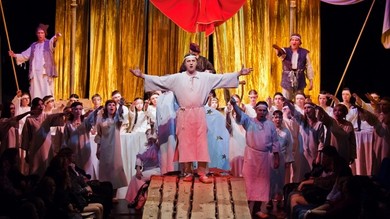Chamber Stage
PROLOGUE
Man - “Human nature”, created in the image and likeness of God, complains in despair about what happened to him after the fall and exile from Paradise: “My mind and memory are preserved, but wisdom, holiness and immortality are otvyaty imperishability. Will, mind and memory are connected in a single knot: I want to rejoice, memory immediately lets you know that grief follows joy ”. People are trying to support Faith, Hope and Love: "Do not despair, because you are surrounded by peace, love and eternal joy." A person objects: all good qualities have their opposite - and promises to show it to the audience.
Seven good qualities are presented in the form of seven allegorical figures that personify the Golden Age, Meekness, Peace, Happiness, Softness, Joy, Love. Seven opposites are opposed to good qualities: Iron Age, Rage, Scolding, Envy, Malice, Crying, Hatred. They blame Man for the fact that he himself has replaced positive qualities with negative ones: a calm life - with discord, a gentleness - with anger, joy with - sobs, love - with hatred. Allegorical figures offer Man to see what happens to him because of sins, and enter into the struggle for human nature. The apotheosis of the struggle is the confrontation of Life and Death.
A man in horror realizes how unstable the world is. He sets off, and the seven “clean” and “unclean” pairs follow him.
ACTION FIRST
In the vicinity of Bethlehem, the shepherd Afonya waits for his comrades Abraham and Boris, who went to the city to buy bread, and he was left to look after the flock of sheep. In order not to be scared, Afonya sings a carol.
His comrades are returning. Suddenly they hear the angelic singing “Christ is born”. The Archangel who appeared to them heralds the birth of the Savior. The shepherds go to see, "Is there a baby spoken in the manger?" Angels sing lullaby to Jesus. The shepherds feel sorry for the baby lying "on the sharp hay," and ask him for forgiveness for what, that they cannot warm him with anything, for the poor themselves.
Stargazer appears with a telescope. He predicts the future by the stars: the harvest will now be good, but "scientists will not be honored enough, they will barely give them enough to drink, to eat." Magi come. They are surprised by the appearance of a new bright star in the sky. She calls them along, and the wise men set off.
ACTION TWO
Palace of King Herod. Retinue, concubines and senators with all their might praise and amuse Herod. The messenger is and informs you that a new king of Judea was born and the Magi are sent to him with gifts. Herod goes berserk: “I am the king, and no one but me!”
The senator persuades Herod not to execute the innocent messenger, to change anger to mercy and to accept the Magi. With cunning he will be able to ferret him out of the Magi's baby field. Senators advise the king to prepare not only gifts for the newborn, but also weapons.
Herod asks the Magi. Those answer that the new star heralded the birth of a glorious, honest and wise man who will be conquered by the world. According to the star, they will seek him out to worship and honor the gifts. Herod wonders what the gifts are. Gold, mira (fragrant oil from the Arabian myrtle) and frankincense: "all that befits the king of the world," the Magi answered. Herod invites the Magi to the land of Judah and promises that no one will obstruct them.
The senators read in the Talmud that the new king of Judea was born in Bethlehem, and advise Herod to send warriors there to kill all the boys under two years old. Herod orders: “Be cruel: beat two-year-old and overwhelming youths, de between them the new king will be killed ...” The warriors go to a terrible thing. The land of Bethlehem is stained with the blood of innocent babies. The murdered Rachel's lament sounds over the slain.
Warriors announce the death of "four and ten thousand will pay." The heads of the slain, wrapped in matter, are thrown at the feet of King Herod. Death appears and starts its terrible dance. Tsarist courtiers echo deaths. However, Herod asks everyone to leave: he wants to sleep. The angels sing to him a lullaby, foreboding death, and bring a thicket of blood to the king. Archangel read to Herod a place in hell. Senators feel the stench emanating from their lord.
Herod complains of indisposition. A doctor appears. He lists all the diseases of Herod: plague, jaundice, pleurisy, dysentery, paralysis, brainstroke ... "Your king is very sick," the doctor concludes and advises to stay away from the dying. Herod asks for a helping hand, but everyone turns away from him. Herod dies in terrible agony and falls into the abyss.
EPILOGUE
Good and evil allegorical figures find out what is able to detach a person from eternal life. Neither swearing, nor crying, nor hatred, nor malice, nor even death itself "will not detach from eternal life"! Human nature is eternal, it will extend its kind of good deeds. "Things will glorify the region for sunflower, for themselves they will leave namyat endlessly." | ||||||||||


